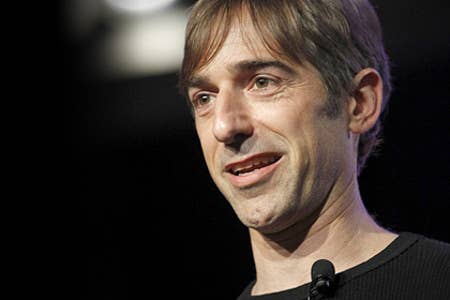Zynga Interview: Mark Pincus In Depth
Part one of a rare conversation with the man behind the #1 social gaming company
The Chairman and CEO of Zynga, Mark Pincus, rarely grants interviews. After months of trying, GamesIndustry International was finally able to sit down with Pincus for an extended interview; one of the longest he's ever given in fact. What followed is a wide-ranging discussion about Zynga and games, and where Pincus sees the opportunities for Zynga.
Mark Pincus is, according to Forbes, the 256th wealthiest individual in the United States, with a net worth in the neighborhood of $1.8 billion. He's a serial entrepreneur, having founded several other technology companies before Zynga. He has a B.S. in Economics from Wharton, and his MBA from Harvard Business School.
Zynga, the company he co-founded five years ago in 2007, has grown rapidly along with the tremendous growth of Facebook over that time period. Zynga's market capitalization right now is about $3.6 billion; by comparison, Electronic Arts' market cap is at $3.7 billion after nearly 30 years in business. Zynga currently has nearly 250 million monthly active users of its games, which appear on Facebook, mobile devices and their Zynga.com website. Zynga went public on December 16, 2011; its stock price climbed over $14 per share by March, only to drop down to less than $5 per share today.
Zynga's explosive growth has left it with plenty of critics as well as millions of players. The company has been criticized for copying games, not keeping its stock price up, and being in a declining market. Zynga continues to introduce new games and expand its reach on mobile devices, and just how well this has been succeeding we will find out when their latest earnings report is released next week.
GamesIndustry International sat down with Mark Pincus at the GamesBeat conference in San Francisco last week, right after his appearance on stage to launch the conference.
I just ran into two analysts from Lazard and Baird in the hall and they said that what they thought was funny was that the analysts who were there were really positive, and they said the analysts who weren't there were really negative.
It's not in my main frame of reference. What I spend my time on is what I talked about on stage. I'm thinking about how do we build a large, scalable, repeatable market, and how do we bring hundreds of millions of people into gaming, make it really social, keep them there, move buyer conversion, move across platforms, new categories. That's my frame of reference and what I think is interesting, and what I think will serve investors in one year or two years or three years. I don't think that spending my time reading analyst reports and trying to figure out why somebody didn't like our stock is the best use of my time.
I'm trying to serve current shareholders and future shareholders. I've always wanted investors to feel like Zynga was a good deal and the best way for them to invest in these growth categories, in free-to-play gaming and social gaming in the West. I'm a bigger optimist about this future, and I think investors have to decide whether they agree with my optimistic outlook on the future for all of this or not. Then if they do, they need to decide whether or not we represent the best company for them to pursue that with.
"Investors have to decide whether they agree with my optimistic outlook on the future for all of this or not"
Mark Pincus
I think you've heard Facebook talk about this as well. There is a law of large numbers, as in: There's only so many people on the planet, there's only so many people in America, and so when they're all on Facebook it's hard to be showing big exciting new user growth numbers. I think that the market opportunity going forward is more about driving new play opportunities, new game mechanics that make games either more social, which we think is the best growth driver, but also have more game mechanics that...have been proven out in core gaming and MMOs for so many years.
Part of the opportunity for all of us over the next five years is how do we package those up in a way that can fit in this form factor [Pincus points to smartphone] of a very small screen, small attention span, and someone who's not going to read instructions, not going to do tutorials, and it's got to have a very, very light, soft on-ramp but have a lot of depth of where that experience can go. I think the opportunity is to continue to innovate - it's a new kind of innovation.
I don't think it's as much that you invent the next 'what's after guilds?', but I think it's more how do you take something like guilds and make that something that isn't called guilds, that's more like a tea party that your mom can get into. There are so many different ways for companies to go after delivering on the game opportunity; we want to be consumer and mass-market. So we're fundamentally interested in games that bring people together, not games that are narrow and divide each other.
There's opportunity in both. I think there's just great opportunities opening up in free-to-play in general. I think all free-to-play... as we lower the barriers, and the number one barrier is spending money, and the number 2 is the physical, whether it's a download or a package, but beyond that I'm coming at this from this personal bent. I fundamentally believe that the biggest opportunity is to get people like me to play. I'm a latent gamer; it's there, it's just in the background because I'm too busy, and I can't find the time, I can't justify the time. But if you could get it in front of me and you could distill it down to something that I could get into in five minutes, and I could play it with friends and other people, you would have me. It's gotta be short-form, short session, long arc.
I think that there's a mentality around me that I fundamentally believe represents a really interesting new mass-market opportunity - in that net you could capture gamers like my nephews, they're gamers, from Halo 3 to World of Warcraft, but they played CityVille. Also in that net you can capture my mother, you can capture Michael Arrington [former editor of TechCrunch], and I'm turned on by all the people who are too grown up to play, who are too busy to play. They saw games as nerdy and dorky, and now they're playing. And you know what? They have a lot of money they could spend if they wanted to. It's nothing for them. It's not a lot for Alec Baldwin to spend money in a game, I would guess. I don't think I've communicated this right, and it gets distilled within existing paradigms of how people look at the game industry, but I look at this the way someone might have looked at e-commerce on the web. I look at this as a web or a mobile opportunity.
To me it's lowering the barriers to play, opening this so wide that it's an everyone experience, and I think that that, in addition to bringing in a new market, I think it has all kinds of network effects that make the game fundamentally more interesting. It's cool when everyone's playing a game. It becomes a cultural topic, like when everybody is watching Game of Thrones and talking about it, it makes Game of Thrones cultural content, not just TV content. That's this kind of cultural meme that I'm excited about, and that's what we're pursuing as a company.

It's a sandbox. We look at Zynga.com as this holistic front-end to our network, where we can try everything at once, and move really quickly, innovate faster. So the team is really inspired by being able to, for the first time, turn on some of these network-level mechanics. At Unleashed the team showed off head-to-head play, the multiplayer, live synchronous play that we built as a widget that we can plug into an arcade game, not just Bubble Safari. That is a couple lines of code that could let anybody turn on head-to-head play.
We're really into how deep you can go with the social gaming experience. It's not part of a lot of experiences; that's all we ever want to be. We think we've just scratched the surface with zFriends and all the different ways that we can start to let you accumulate an interesting profile over time. That could be icebreakers, ways for other people to get to know you - they might be your friends who didn't know your gamer persona. There's so many ways, like in Settlers of Catan, in these games that we actually get to know each other better. They give us another form of expression.
Part of our job as game designers and social game designers, it's kind of like a Halloween party or a masquerade party, and we've got to give you lots of costume options that are easy for you to try on and let you express your personality, so that you can meet other people and have fun. I think it's just a different mentality than either someone who's just about social networking or just about gaming, because - and I know we cross over both in ways that could pull us into those camps or get compared to those - but that's not this meme that we're passionately pursuing.
Right, you kind of discover it through the product experience. I've always believed that your best branding, your best marketing, your best PR is your product experience. If you do that right, anyone who touches your product gets it. They get the essence of the experience, what you're about. I think that matters more than what's on the back of the box or what you promoted at your Unleashed event or whatever.
"I'm a latent gamer, it's there, it's just in the background because I'm too busy"
Mark Pincus
I've always joked that you're only as good as what some user fill-in-the-blank college girl who wants to say about your product on her wall post, or someone on the plane turning to the next person. We're only as good as our word-of-mouth. It's a great currency, because it doesn't lie. It's very hard to get it right, but when you do, it can be really explosive. We've seen it. When I look at the games that have broken through on that cultural level, they've become word-of-mouth phenomena, they're not easily repeatable, but I do think they're shots across the bow that point to the future. I don't see them as aberrations or one-offs.
I'll give you one other analogy that's useful. I look at TV and I am a latent TV watcher too. I have a latent addiction to TV, and it's seldom filled, but when it is I get obsessed with it. I get obsessed with these episodic shows. I was obsessed with Lost, I was obsessed with Breaking Bad, Game of Thrones, and I want to find that new show and I'm really kind of sad, like finishing a great book, when I get to the last episode. In fact, with Breaking Bad we rationed ourselves last summer, and I would only let my friends watch one episode a day, and I was counting how many days we had left, and it was really sad. Now I'm really into The Newsroom. There is some repeatable, but not easy, thread to all those shows, a certain formula to all those shows. If it's formulaic you won't like it. Breaking Bad was fresh, it was unexpected, it was surprise and delight. If somebody made a bad copy of Breaking Bad you wouldn't be excited. It's hard.
But I think that is a repeatable thing. I'm optimistic about TV's future because of those shows; before those shows I wasn't. Breaking Bad brought me back to TV. Similarly, I think we're just entering that kind of era with social gaming. I think once somebody has that experience - I was addicted to CityVille the way I was addicted to Breaking Bad, to the point that, I remember a year ago Christmas, planning my day around my CityVille play experience. I was in Colorado with my family, and I was thinking, OK, I need time between the kid's nap at this time, I get home this time, I gotta break out an hour, probably an hour, because I gotta go and play CityVille. When I reached the point I was done with it, I was kind of sad to move on. I want that again. I believe it's possible to scratch that itch for me again.
Yeah.

Yes. So there's familiar, predictable, but there's also the twist. I think fundamentally that what's inside me really getting into a game, I want to feel like my decisions matter. I want to feel like I'm making meaningful decisions, and I want to get immediate gratification if I'm making good decisions, and they lead to some long-term better place. That's kind of on the game side; on the social side, I want to feel like the way I'm playing, the decisions I'm making, give me the chance to share some emotion with somebody. Usually it's a laugh.
Part Two of our exclusive interview with Mark Pincus is now live

